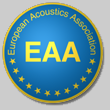
EAA Technical Committee Physiological and Psychological Acoustics
EAA TC-PPA
During the 12th International Symposium on Hearing in Mierlo in the year 2000 an initiative was formed to promote the formation of a technical committee “Psychological and physiological acoustics” (TC P&P) within the organization of the EAA. This committee started its provisional operation with a TC meeting at the EAA convention in Sevilla in 2002. At this meeting, Georg Klump (Oldenburg University, Germany) and Armin Kohlrausch (Philips Research Laboratories and Technical University Eindhoven, The Netherlands) were elected as speakers of the TC. The second meeting of the TC took place during the EAA convention in Budapest in 2005.
Which
topics describe the field of research covered by the TC P&P?
The TC P&P interconnects researchers from the fields of psychophysics
and physiology of the auditory system, and modellers using an approach that
is based on neural structures in the auditory system (i.e., use a systems
approach). Meetings like the International Symposium on Hearing have demonstrated
that bringing together the scientists from these three fields allows for a
better understanding of the processing mechanisms in the auditory system and
the perceptual consequences. By making predictions about the system behaviour,
models help to generate testable hypotheses about the functional consequences
of a certain neural circuit and its response patterns. The physiological studies
can provide evidence whether a certain mechanism of processing in the auditory
system offers a sufficient explanation for a perceptual phenomenon. Understanding
the physiological mechanisms underlying auditory perception will not only
have its own merits but may foster new developments in hearing-aid technology
and in acoustic man-computer interactions.
What are
the goals of the TC P&P?
The goals of the TC P&P are to provide an organizational basis for exchange
of students and more experienced researchers between laboratories, to offer
a market of opportunities for graduate students and postdoctoral fellows,
and to support teaching activities on the European level such as summer schools
focussed on specific topics linking the different fields. It can supply a
website with information that is useful for teaching such as links to course
materials covering auditory physiology and psychoacoustics, to demonstrations
of auditory mechanisms, or by offering information on CDs providing tutorials
in the field of audition. Since knowledge about human hearing is of increased
relevance for a number of technical systems (perceptual audio coding, digital
hearing aids, augmented and virtual environments, to name a few) the TC P&P
will also act as a link between academic research institutions and (industrial)
institutions of applied research (job market, industrial internships, supranational
funding initiatives). As a timely example, the TC P&P should propose fields
of interest for future research funded on the European level and take an active
role in setting the research goals at the EU level. It should make an effort
to form new links between national scientific communities in the field by
using the organizational framework provided by the EAA.
Who would
benefit from a membership in the TC P&P?
Established as well as young researchers in the field of hearing science will
form the core in the starting phase of the TC P&P. They will benefit from
the goals of the TC themselves and can provide the network for integrating
graduate students that aim at developing an interdisciplinary approach to
the field.
Activities
Members of the TC, as other European colleagues, have been involved in setting
up structured sessions at the conventions of the EAA. The first activity to
take place outside of the conventions is a workshop for Ph.D. students in
audition, in which an overview of job opportunities is given (end of April,
2006). Information about this workshop can be obtained from the EAA WEB page
(click
here)
Chairs of EAA TC-PPA:
Georg
Klump
AG Zoophysiology and Behaviour, Oldenburg University
Carl-von-Ossietzky St. 9-11
D-26129 Oldenburg, Germany
Phone: +49 441 798 3400
Fax: +49 441 798 5615
e-mail: georg.klump@uni-oldenburg.de
Armin
Kohlrausch
Philips Research Laboratories
Prof. Holslaan 4, WO 02
5656 AA Eindhoven, The Netherlands
Phone: +31 40 2743093
Fax: +31 40 2744675
e-mail: armin.kohlrausch@philips.com